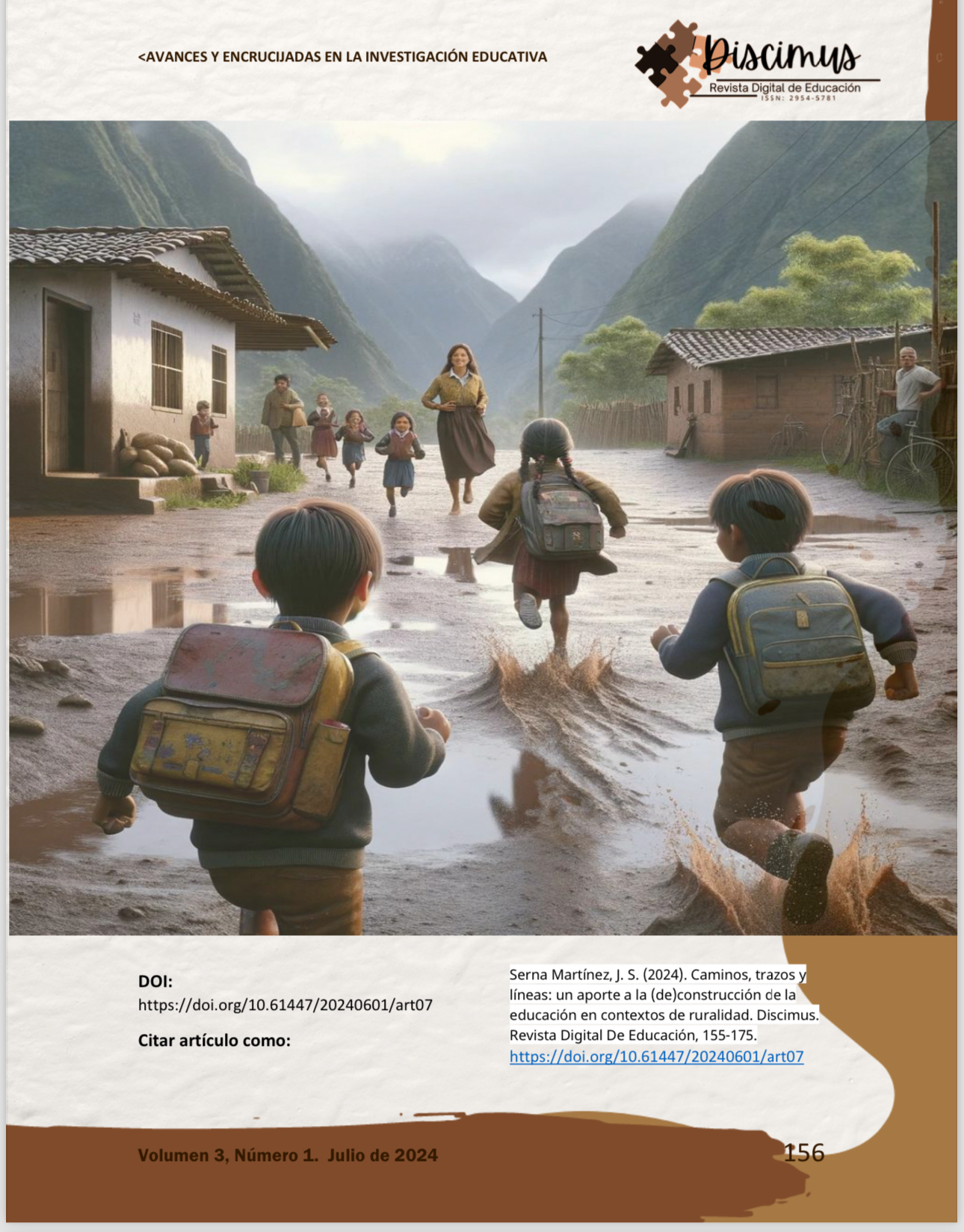Paths, strokes and lines: a contribution to the (de)construction of education in rural contexts.
Main Article Content
Abstract
Abstract
This article of reflection arises from experiences lived as a teacher and researcher of an educational institution located in a rural context, as secretary of education of a Colombian municipality classified as sixth category and from the results that emerged in the development of my research work on master's degree. This is how tensions, challenges, realities, and opportunities are made known, to think and (re)think what education is today in the context of rurality, taking as its axis the municipality of Venecia - Southwest Antioqueño Colombiano, which It allowed me to get closer and make known those educational realities that teachers, students, families, teaching directors and the community in general face every day. The objective of this reflective article is to go in search of proposing lines of deterritorialization, in the sense that is addressed by the philosophers Guilles Deleuze and Félix Guattari, for the staging of the existence of other ways of seeing, living and being in the country school. Thus, by assuming cartography as a methodological route, some facts are revealed that complement the present reflection, and that will be that starting point to show experiences, paths and paths towards other ways of feeling, knowing, constructing and (in)build the rural school, based on their identities, traditions and cosmogonies.
Downloads
Article Details
Section

This work is licensed under a Creative Commons Attribution-NonCommercial-ShareAlike 4.0 International License.
Open Access Policy at Discimus Journal
Discimus Journal is committed to the promotion of free circulation of scientific and academic knowledge, simultaneously ensuring appropriate acknowledgment for our authors while adhering to the ethical principles of scientific publishing. In alignment with this goal, Discimus publishes all its articles under the ATTRIBUTION-NONCOMMERCIAL-SHAREALIKE 4.0 INTERNATIONAL CC BY-NC-SA 4.0
How to Cite
References
Arias, J. (2017). Problemas y retos de la educación rural colombiana. Educación y Ciudad. (33). 53-62. Disponible en: https://dialnet.unirioja.es/servlet/articulo?codigo=6213576
Boix, T. (2014). La escuela rural en la dimensión territorial. Innovación educativa. (24). 89-97. Disponible en: http://www.usc.es/revistas/index.php/ie/article/view/1959
Boix, T. (2003). Escuela rural y territorio: entre la desruralización y la cultura local. Revista Digital eRural, Educación, cultura y desarrollo rural. 1(1). 1-8. Disponible en: http://educación.upa.cl/revistaerural/erural.htm }
Cadavid, A. (2019). Escuela nueva en Colombia, un análisis del componente curricular [Tesis Doctoral, Universidad de Antioquia]. Repositorio institucional.
Caicedo, S. (2022). Relatos de huerta: ¿un lugar para la construcción de saberes e identidad campesina? [Tesis de Maestría, Universidad de Antioquia]. Repositorio Institucional.
Decreto 3020 del 2002. (2002, 10 de diciembre). Ministerio de educación Nacional. https://www.mineducacion.gov.co/1621/articles-104848_archivo_pdf.pdf
Deleuze, G. y Guattari, F. (2004). Mil mesetas: capitalismo y esquizofrenia. (Traducido de Vázquez, J.). España: PRE-TEXTOS.
Larrosa, J. (2009). Experiencia y alteridad en educación. En C. Skliar y J. Larrosa. (Eds.). Experiencia y alteridad en educación (pp. 13-44). Ediciones Homosapiens.
Martínez, D., Serna, J. y Arrubla, J. (2020a). Experiencias de Profesores(as) de Matemática sobre la Evaluación en el contexto de la ruralidad: quitar máscaras para mostrar caras auténticas [Tesis de Maestría, Universidad de Antioquia]. Repositorio Institucional.
Martínez, D., Serna, J., & Arrubla, J. (2020b). Educación Rural y dispositivo evaluación en tiempos de ‘COVID-19’: voces de profesores de Matemática. En Revista Latinoamericana de Etnomatemática. 13(1). 86-103. Disponible en: https://www.revista.etnomatematica.org/index.php/RevLatEm/article/view/591
Quintero, N. (2020). Educación [Matemática] Rural y Decolonialidad: una problematización indisciplinar de prácticas sociales del trapiche [Tesis de Maestría, Universidad de Antioquia]. Repositorio Institucional.
Silva, T. (1999). Documentos de identidad: una introducción a la teoría del currículo. Aautêntica Editorial.
Resolución 012880 del 2020. (2020, 14 de julio). Ministerio de educación Nacional. https://www.mineducacion.gov.co/1780/articles-400019_pdf.pdf
Resolución 00335 del 2021. (2021, 23 de diciembre). Ministerio de educación Nacional – Unidad Administrativa Especial de Alimentación Escolar. https://www.studocu.com/co/document/universidad-cooperativa-de-colombia/derecho-de-los-contratos/resolucion-335-de-2021-resolucion-355-de-2021/32322197
Rolnik, S. (1989). Cartografia sentimental: transformações contemporâneas do desejo. Estação Liberdade.
Universidad de Antioquia. (2023). Factores que se relacionan con la deserción escolar en los municipios no certificados de Antioquia. https://www.seduca.gov.co/images/2023/reporte_def.pdf
Valencia, L. (2015). Estereotipos y educación rural: visibilizando los hilos que tejen el sentido de la educación en el campo. Estudio de caso etnográfico en una institución educativa rural del municipio de marinilla. [Tesis de Maestría, Universidad de Antioquia]. Repositorio Institucional.





